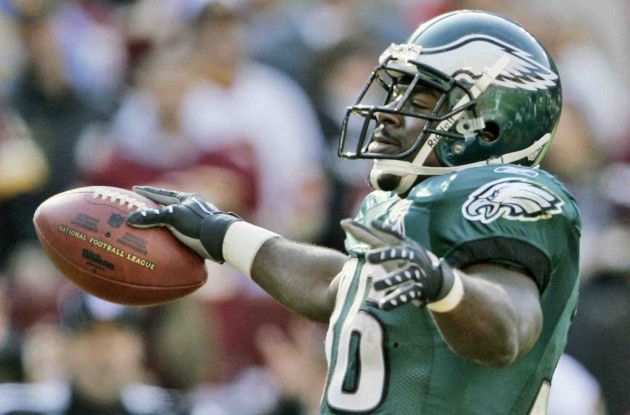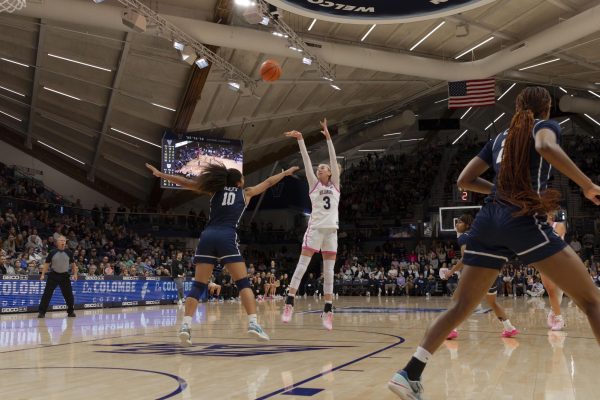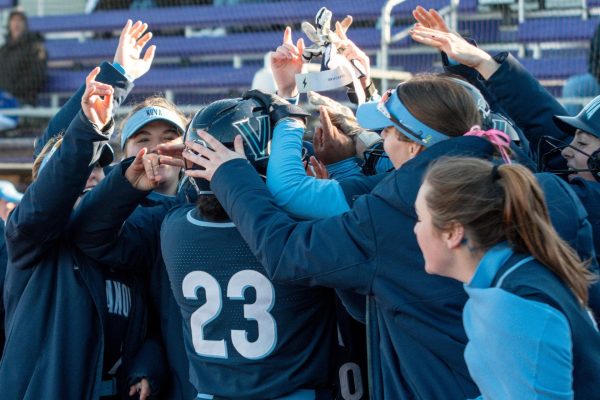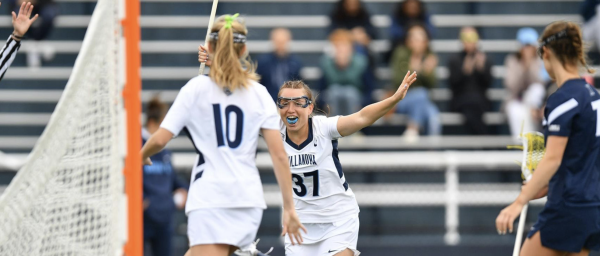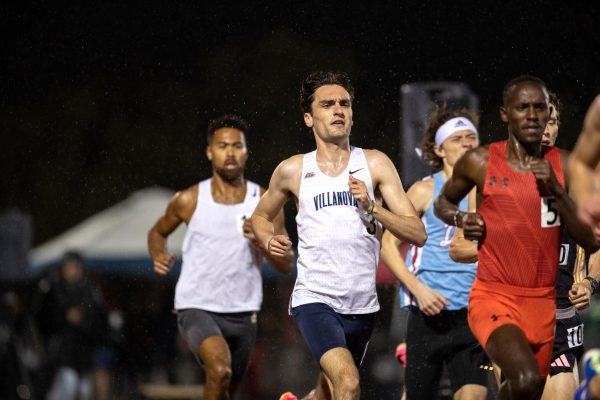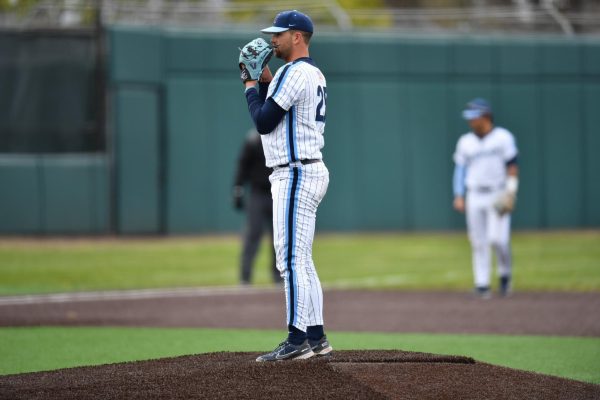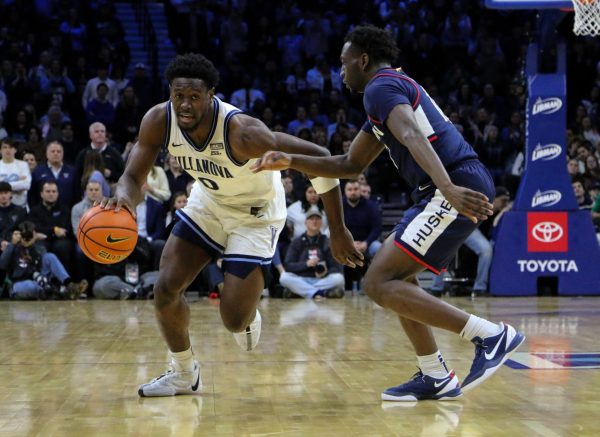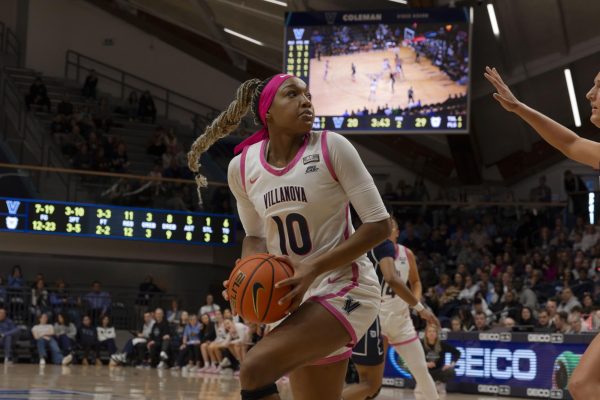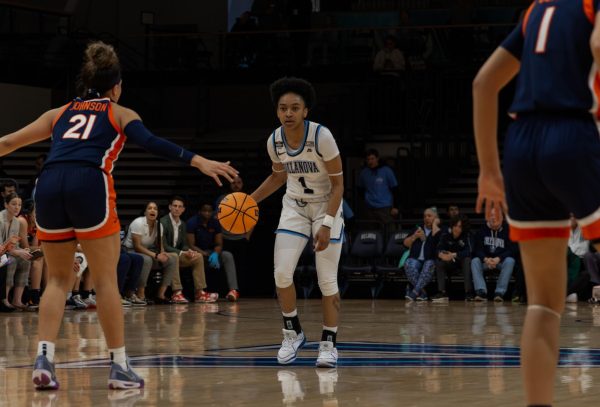Remembering his roots: Westbrook reflects on his Villanova start
November 15, 2016

Courtesy of FastSportsPhilly.com
When you hear the name Brian Westbrook, what first comes to mind?
His game winning punt return touchdown in 2003 against the Giants at the Meadowlands? His touchdown in Super Bowl XXXIX to tie the score at 14? Or his go ahead 71 yard touchdown against the Vikings in the 2008 NFC Wildcard game? Regardless of the countless touchdowns and dazzling runs, most of us remember him as an All-Pro Running Back for the Philadelphia Eagles. But before he established himself as one of the best running backs in Eagles history, Westbrook worked on his craft to attract NFL scouts on the Main Line.
Growing up in Ft. Washington, Md., Brian Westbrook was surrounded by athletics his whole life. “I was raised in an athletic sports family,” says Westbrook about his time growing up. His father was drafted and played minor league baseball, and his uncles played baseball, basketball and football in college. With a history of athletes in his family, there was a large influence on him and his brother to participate in athletics. After participating in multiple sports, such as basketball, soccer, baseball and football, there was a point in his life where his “natural urges” took over his body and became his influence to play football.
While he could have attended public school, Westbrook decided to enroll at DeMatha Catholic High School, one of the premier high schools in Maryland. “DeMatha was the best choice [for me] and is still one of the best schools in the country. I really found a school that brings excellence on the football field, and more importantly in the classroom. It was important for my parents (for me) to go to a school where I could get a great education that was second to none,” Westbrook said about his choice to attend DeMatha. During his time as a DeMatha Stag, he accomplished excellence as an honor roll student in the classroom and received First Team All League and other honors on the football field.
In his senior year of high school, he tore his ACL and only played in five football games. That injury hindered him from playing at larger football schools. Despite his large setback, Westbrook still received scholarship offers from Maryland, Richmond and Dayton. While those schools were close to home and seemed appealing, there was one school separated itself from the rest of the pack: Villanova.
“Out of all those schools,” Westbrook recalled, “Villanova was a perfect mix of academics and athletics, which was of the utmost importance when I was looking at schools.”
Before visiting the campus on his recruiting visit, the only information he knew about the ‘Cats was that they had a winning basketball program, since he grew up watching Georgetown basketball as a child and witnessing the ’85 Championship. After visiting campus, Westbrook understood the culture of the University and its football program.
“I then started doing research of how good of a program, as far as football wise, that they [‘Nova] had. That definitely drew me to the university,” Westbrook said of his decision to choose the school on the main line.
In addition to the academic tradition and the success of its football program, Andy Talley played a significant role in his decision to attend Villanova. Many of Talley’s players realize how special he is today, and Westbrook couldn’t agree more. He recalls Talley as a father figure away from home.
Talley was “able to teach young men who were away from home, away from their parents for the first time and tell them what time to go to bed, what time to study,” Westbrook said. “So you’re teaching young men in a different mindset how to be a man all while you have the importance of getting your schoolwork done and trying to win football games. Coach Talley has a unique way of showing tough love at times, but also a nurturing side that allows so many guys to flourish in an environment at Villanova University. Coach Talley and his staff gave you an outlet, someone to talk to and showed you the way. I think for [a college player] at a young age, that’s what you really need. Someone to guide and show you, how to be a man and how to get along in life.”
While Westbrook focused on his academics, he excelled on the football field right away as a freshman. While he didn’t receive a lot of playing time initially, by the end of his freshman year he impacted Villanova’s offense in a big way. He played all 13 games, rushing for 630 yards and seven touchdowns, as well as recording 113 receiving yards and four more touchdowns.
He was able to attract the attention of NFL scouts with his breakout performance in the season opener of his sophomore year against Pittsburgh. Although Villanova lost 48-41, Westbrook had 428 all-purpose yards against the Panthers, recording a performance in multiple facets of the game. He had 114 rushing yards and a TD, 116 yards receiving and two TDs, and three kickoffs returns for 152 yards, including an 89-yard return for a TD. With this spectacular performance, Westbrook earned Atlantic 10 Offensive Player of the Week and set the Villanova school record for all-purpose yards in a game.
“The game was up for grabs, no question, and Brian almost single-handedly beat them [Pittsburgh] by himself,” Talley recalled in a Philly.com article earlier this year. “We couldn’t stop them, and they couldn’t stop Brian.” Even Pitt’s coach, Walt Harris, was impressed with Westbrook’s performance as coach Talley remembers him saying after the game, “Who in the hell is No. 20?”
Although he admits that it may have been early that NFL scouts were looking at him in his sophomore year, Westbrook remembers that performance like it was yesterday. “You just never know when scouts are looking at you]. When you have good games, like I had against Pittsburgh, it starts to open eyes. You start to have people looking at you and see what you can do, and they don’t want to miss out on something right,” especially if it’s in the backyard of the Pittsburgh Steelers. “I was able to open some eyes that way by playing against better competition my sophomore year” Westbrook added. “That was the thinking that could put my name on the map.”
In addition to his performance against Pittsburgh, Westbrook had a successful sophomore campaign. He earned First Team All-American honors, and he became the first player in the history of college football at any level to rush for 1,000 yards and receive 1,000 yards in the same season. Unfortunately, he redshirted his junior year after having surgery on his ACL that he tore as a senior in high school. Although his knee healed in time to play his freshman year at Villanova, “My knee wasn’t responding the way it needed to. By the time training camp came [that season], I knew I needed to have surgery.”
After sitting out his junior year, Westbrook bounced back and had two more successful seasons as a Wildcat. He would finish his Villanova career with 4,449 rushing yards, 2,639 receiving yards, and 2,433 kickoff return yards, all Villanova records. While he broke 41 school records and received a number of awards, he is most proud of receiving the Walter Payton Award in 2001, his last season as a Wildcat.
“Winning the Walter Payton Award meant a lot to me,” Westbrook said. “There were other years where my numbers were good enough to win it, and I didn’t win it. It was a kind of culmination of hard work, coming off injury and playing well. I appreciated the fact that my teammates were the ones that helped me to be good enough, to win that award.”
His coach couldn’t have been more proud to coach a player like Westbrook.
“Brian Westbrook is obviously a legend,” Talley said. “The best running back that ever played at Villanova and one of the best that ever played in FCS and maybe all of the country. He was an all purpose player—he could run, he could catch, return kickoffs, punt returns, and he’s a guy who could do it all”.
Today, Talley means a lot to Westbrook. With Talley in his final season, Westbrook reflected how much Talley means to the football program. He agrees that Coach Talley should be considered the “Godfather” of Villanova, which RB Aaron Forbes suggested a few weeks ago.
“I think for the football program, he should be considered that,” Westbrook said. “He brought the [football] program back. And when you think of Villanova football, you definitely need to talk about Andy Talley.”
To this day, Westbrook passes on the lessons he learned from Talley to the young students and athletes he speaks to at public events.
“I think one of the most important things that Coach Talley would tell guys is, ‘It’s nice to be important, but it’s more important to be nice,’” Westbrook said, referencing a plaque that hangs above the door in Talley’s office.
“Please and thank yous go a long way,” Westbrook adds. “All those types of small things are real life trues that hold true for a lot of different things. Those are things that, in the state our country is in now, we have things that we should hold on to and those are things that Coach Talley was teaching 20 years ago. Throughout my life, I’ve seen how using your manners, being polite to others, not making yourself seem like you’re more important than anyone else. All those things play an important factor in the world and how people receive you. These are lessons that Coach Talley taught while I was at Villanova.”
Even as he’s gone on to incredible success beyond Villanova, Westbrook has not forgotten the values he has come from—and for that, he serves as an example to us all

